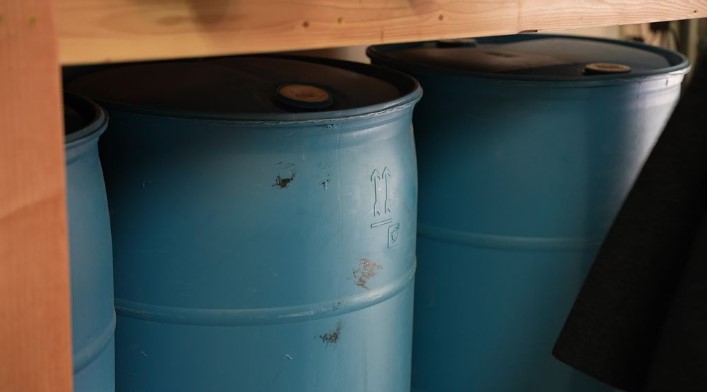China’s economy is plunging into an unprecedented and dire phase, sounding deafening alarms that the Chinese government hopes to muffle, but they are growing too loud to ignore. This looming collapse is an ominous warning to America and the entire world as we are witnessing this unsettling unraveling in real-time. So, what do we need to know about this? China isn’t exactly transparent, most recently halting economic data releases to keep the world in the dark, which is just not a good sign. What they are hiding is that their state-controlled economy is unravelling due to debt, misguided investments, and eroding credibility. The question is, how bad could it get and what impact could it have on you? And most importantly, what can you do to prepare? Let’s talk about it.
3 REASONS CHINA COULD SHOCK THE WORLD
1) UNINFORMED POPULATION
 The course and direction of a country are often determined by its citizens, and China’s citizenry is becoming increasingly upset and agitated, or are they? Some things we know, and some things we don’t. We know the suppression of information and censorship might keep them from blaming their problems on the Chinese government, and the government is keeping information from them. The Chinese Communist Party had a botched COVID response–Draconian lockdown of apartment complexes and factories; workers forced to work instead of going home, then suddenly all measures were lifted as if they never occurred.
The course and direction of a country are often determined by its citizens, and China’s citizenry is becoming increasingly upset and agitated, or are they? Some things we know, and some things we don’t. We know the suppression of information and censorship might keep them from blaming their problems on the Chinese government, and the government is keeping information from them. The Chinese Communist Party had a botched COVID response–Draconian lockdown of apartment complexes and factories; workers forced to work instead of going home, then suddenly all measures were lifted as if they never occurred.
China has ceased reporting economic data that could reveal its true economic health. For instance, they stopped publishing youth unemployment figures, citing a need to review their methodology. The most recent available data showed a record-high youth unemployment rate of 21.3% in June for those aged 16 to 24. It’s possible that it’s even higher now, possibly exceeding 25%, but we lack current information. In addition, China has limited access for foreign users to corporate registries and academic journals. They have also clamped down on due diligence firms, which are vital sources of information for overseas businesses interested in China. It’s evident that the Chinese government is actively suppressing information and engaged in extensive damage control.
The Chinese people don’t really understand how teetering their economy truly is because the government doesn’t want that to be known. Even today, if the ruling Chinese Communist Party doesn’t like data or it reflects negatively on them, they simply don’t report it. The world has to wonder what’s really going on in the people’s minds, what they actually know and don’t know, and whether their frustration level will ever be more potent than the government’s ability to hold them down.
2) OVERBUILDING & COLLAPSE
 China has followed an investment-led economic growth model, heavily focusing on infrastructure and construction. However, this approach has led to significant overbuilding, with excess housing units that could house twice the entire Chinese population. Did you catch that? There’s two residences available for each of the 1.412 billion people. In China, home ownership for investment is favored over stocks. As a result, China has responded to this by building, and building, and building giving people to buy properties that are sitting vacant. Unlike the U.S., China’s stock market is less closely tied to the economy at individual and corporate levels. Chinese firms tend to rely more on bank loans and retained earnings rather than equity financing, in contrast to U.S. companies. Only around 7% of Chinese households own stocks, compared to 53% in the U.S. This leads to a liquidity issue, as it’s easier to sell stocks than vacant properties in a market with a surplus of available properties.
China has followed an investment-led economic growth model, heavily focusing on infrastructure and construction. However, this approach has led to significant overbuilding, with excess housing units that could house twice the entire Chinese population. Did you catch that? There’s two residences available for each of the 1.412 billion people. In China, home ownership for investment is favored over stocks. As a result, China has responded to this by building, and building, and building giving people to buy properties that are sitting vacant. Unlike the U.S., China’s stock market is less closely tied to the economy at individual and corporate levels. Chinese firms tend to rely more on bank loans and retained earnings rather than equity financing, in contrast to U.S. companies. Only around 7% of Chinese households own stocks, compared to 53% in the U.S. This leads to a liquidity issue, as it’s easier to sell stocks than vacant properties in a market with a surplus of available properties.
This has led to the citizenry purchasing homes enthusiastically as an investment vehicle leading them to invest in multiple apartments, accumulating second, third, and even fourth properties. As the economy suffers, however, they find themselves unable to make payments on some of these properties and unable to unload them to take a loss on them. Again, that’s two residences available for each person. This massive overbuild presents a problem that surpasses anything seen in the American subprime crisis.
This has been unraveling at a staggering pace, even as the government takes drastic measures to desperately try to stop the freefall. The collapse of Evergrande, a massive Chinese real estate company with over 1,300 projects in more than 280 cities, has sent shockwaves through China’s real estate market, one of the world’s largest, employing over 2.8 million people. As of 2021, Evergrande was grappling with $300 billion in liabilities, failing to meet its obligations to suppliers and offshore lenders, ultimately defaulting on its creditors. This default triggered a market panic, a cascade of defaults, and nationwide protests that were forcefully suppressed. The ongoing real estate crisis, now spanning two years, has raised concerns about financial system contagion risks and is likely contributing to job cuts, housing market declines, and an economic slowdown in China, the full magnitude of which remains uncertain and of global significance.
If the subprime real estate bubble collapse of 2008 in the U.S. that rippled worldwide and plunged many economies into a deep recession was bad, China’s overleveraged position in real estate is likely far, far worse. Foreign direct investment in China’s real estate market is quite extensive. Still, those investors are getting rather skittish as the Chinese Communist Party continues to demonstrate that it is having difficulty righting the ship that is its economy.
The government continues to struggle to radically adjust and prop the economy up, even as they crack down on billionaire tycoons and use them as scapegoats. Their desperation has lead China to seek and secure substantial resource deals with Russia during the conflict in Ukraine and Russia’s urgent quest for allies and markets. These agreements have the potential to entirely redirect global energy and grain sales, potentially leading to a profound transformation of longstanding trade agreements. These known and unknown deals are altering geopolitics and will have unknown future consequences worldwide.
3) SHIFTING MARKETS
![]() It’s a well-publicized fact that the U.S. has been at economic war with China as it decouples its economy from them. Whether that can be completely done and whether we even want to do that is still in question, but recent years have brought a host of economic moves. The U.S. has taken various financial measures, including imposing tariffs on Chinese imports and embargoing advanced technology sales. Most notable in this decoupling has been the CHIPS Act designed to boost domestic semiconductor manufacturing and research, enhance supply chain security, and promote workforce development to reduce reliance on foreign sources for critical semiconductor components. It has also put a significant drag on China’s production capabilities. These actions aim to reduce imports, protect or bring back U.S. jobs, and safeguard American infrastructure. However, despite these efforts, true decoupling remains more of a geopolitical goal than an economic reality, as China’s share in U.S. imports declined from 21.6% to 16.3% between 2017 and 2022. As a matter of fact, Mexico has surpassed China as the U.S.’s leading trade partner.
It’s a well-publicized fact that the U.S. has been at economic war with China as it decouples its economy from them. Whether that can be completely done and whether we even want to do that is still in question, but recent years have brought a host of economic moves. The U.S. has taken various financial measures, including imposing tariffs on Chinese imports and embargoing advanced technology sales. Most notable in this decoupling has been the CHIPS Act designed to boost domestic semiconductor manufacturing and research, enhance supply chain security, and promote workforce development to reduce reliance on foreign sources for critical semiconductor components. It has also put a significant drag on China’s production capabilities. These actions aim to reduce imports, protect or bring back U.S. jobs, and safeguard American infrastructure. However, despite these efforts, true decoupling remains more of a geopolitical goal than an economic reality, as China’s share in U.S. imports declined from 21.6% to 16.3% between 2017 and 2022. As a matter of fact, Mexico has surpassed China as the U.S.’s leading trade partner.
How effective any of these measures has been, only time will tell. One thing that has been accomplished with certainty is that all these measures have driven China to explore other markets for its goods and resources. China has struck long-term energy resource deals with Russia, which will have far-reaching implications for global supplies and forever has altered the flow of global energy resources. The two countries have signed a 30-year, $400 billion gas supply deal called the Power-of-Siberia pipeline, which began in late 2019. This deal is expected to provide 22 billion cubic meters of gas in 2023 and reach a total capacity of 38 billion cubic meters by 2027, with gas flows increasing nearly 50% to 15.5 billion cubic meters in the previous year. China is working on a Central Asian pipeline to source gas from Turkmenistan, while Russia is also expanding its Siberian connection. Furthermore, Russia supplies oil to China through the East Siberia Pacific Ocean pipeline, resulting in an 8% increase in Chinese imports of Russian crude oil in 2022.
In the first four months of 2023, China imported about 6 million tons of wheat from Russia, greater than 60% more than the previous year. Of that, Russia supplied 30,000 tons.
This is all fine; who cares where they buy their grain or oil, right? Except these purchases significantly fund and prop up the Russian economy, solidifying new supply lines as other supply lines evaporate. If anything should happen to Russia, like Putin’s reign ending or large-scale crop failures, China suddenly has nowhere to turn to feed its people, and it lacks the fiscal resources to pay up to get the food it needs to feed its 1.4 billion people.
China has sought to bolster its markets in a new authoritarian-leaning world realignment, and a new world order is rapidly emerging. The Chinese government has managed to keep its economy afloat through savvy deals, maneuvering, and going from misrepresenting and misreporting numbers to simply not reporting them anymore. These temporary bouncebacks haven’t managed to flip the economy into the black but have kept it from free-falling. They haven’t fixed the underlying problems, and for years, with each, the rest of the world has wondered when the whole thing will fall apart.
Let’s assume for a minute that the shaky economy, the risky deals with countries run by despots, the changing and new supply lines, or the people of China stop working nicely. Let’s assume that one of those fails, crashing the entire Chinese economy. What will that mean to you and me? What will that mean to the world?
CHINA IMPLODES. NOW WHAT?
 If the Chinese economy were to implode suddenly, the consequences for the rest of the world would be substantial and multifaceted. Individuals and businesses should prepare for several potential scenarios. First, a collapse of the Chinese economy would trigger a global recession due to its significant role in the world economy. People should be prepared for possible job losses, reduced economic growth, and financial market volatility. If all the parts and ingredients in everything from medicines to Global Hawk unmanned surveillance drones carried labels as to where it was made, you would be shocked to learn that much of it still comes from China. Dependence on cheap Chinese manufactured items isn’t an addiction that is easily broken.
If the Chinese economy were to implode suddenly, the consequences for the rest of the world would be substantial and multifaceted. Individuals and businesses should prepare for several potential scenarios. First, a collapse of the Chinese economy would trigger a global recession due to its significant role in the world economy. People should be prepared for possible job losses, reduced economic growth, and financial market volatility. If all the parts and ingredients in everything from medicines to Global Hawk unmanned surveillance drones carried labels as to where it was made, you would be shocked to learn that much of it still comes from China. Dependence on cheap Chinese manufactured items isn’t an addiction that is easily broken.
China is the world’s largest producer of pharmaceutical ingredients and produces and exports around 40% of the world’s active pharmaceutical ingredients (APIs). Those APIs predominantly flow to India, which is the world’s largest provider of generic medicines by volume, accounting for 20% of global pharmaceutical exports. India also manufactures 60% of all vaccines in the world. If China implodes, the world’s supply of medicines will immediately plunge to critically low levels.
China is a central manufacturing hub, and its production disruptions could lead to various product shortages. We caught a glimpse of that with the COVID lockdowns, but the country’s economic collapse would be magnitudes greater in impact. The U.S. imports massive quantities of manufactured goods from China, including 70 percent of Walmart’s store merchandise and 40 percent of the clothing sold domestically. It’s not just retail stores that would suddenly find themselves without inventory. In 2020, the United States imported machinery valued at $41 billion from China, making it one of the largest importers of Chinese machinery. Additionally, in 2021, the U.S. imported $13 billion worth of other electrical machinery, primarily sourced from China. These figures highlight the significant reliance on Chinese machinery and electrical equipment in the U.S. market.
Imagine farmers suddenly unable to repair or maintain their equipment. Imagine water companies unable to replace failing equipment. Imagine electrical companies without the necessary equipment and materials to maintain the grid. The quantity of these imports versus domestically manufactured products fluctuates yearly as these governments clash. However, they still find their way here to some degree, even if it is via India or some other intermediary country. No one is ready to see what happens if that supply suddenly seizes.
I have focused on the primary impact China’s economic implosion would have on the U.S., but emerging countries and trade partners worldwide will be impacted as well. Businesses, manufacturers, and distributors worldwide would immediately suffer to an extent large enough to perhaps even topple some countries. This year, We have seen how economic pressures and the application of foreign government influence can directly lead to rebellions and the toppling of established governments. The global dynamics can change considerably when critical food imports to starving countries suddenly stop.
The geopolitical ramifications of a Chinese economic collapse could lead to significant shifts in global power dynamics. People should be prepared for potential changes in international alliances and trade relationships, which could affect their countries’ foreign policy and economic strategies. China, forced into desperate measures to sustain its power and economy, could seek to deflect attention and blame by sparking a conflict in the South China Sea or with Taiwan. China could sell lethal arms and armaments to Russia in exchange for a more significant stake in the resources in the Siberian region. Any number of odd, desperate, and unfriendly alliances could be openly and secretly agreed to in an attempt to stay afloat.
WHAT CAN YOU DO?
When it blows, it’s going to be big, and it’s gonna be painful. Let’s be honest. If you were to stop what you’re doing right now and look around your room, I’d be willing to wager that the majority of what surrounds you somehow or another originated from China. We’ve become so reliant on China’s cheap manufacturing for so long that we’ve gotten addicted. So the short answer is that the stuff won’t be cheap any more.
But as a prepper, I always return to the critical items of food and water. I always suggest having a water supply and a means to treat and filter it ready to go. This is why we cover water storage on the channel and encourage you to begin learning how to produce your own food. I realize gardening is not easy and it requires your time and money. But, as you lessen your dependence on systems that will eventually fail, no matter if you’re starting out and have enough food for a week, you’re on the right path.
You may not be able to change China’s trajectory, but you can bolster your ability to make it through the economic fallout of China’s implosion by getting your own preps in order. Watch our video on building a 2 week essential food supply to start, because this could turn bad quickly. I’ll post a link here on the screen and you watch that video next. What’s your thoughts? What steps are you taking now to prepare for this issue and others that are on the horizon? Let us know in the comments section below.
As always, stay safe out there.









